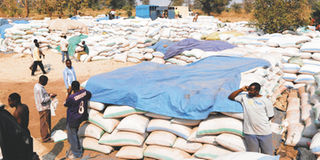How to unlock huge economic potential in EA

One of the maize markets in Sumbawanga District, Rukwa Region. Food security is a prerequisite of development. East Africa must enhance agriculture in order to improve livelihoods of farmers and stakeholders. PHOTO | FILE
What you need to know:
- According to African Development Bank, over 75 per cent of the total agricultural outputs in East Africa are produced by smallholder farmers with farm sizes of about 2.5 hectares on average, producing mainly for home-consumption, and using traditional technologies.
Nairobi. While the agricultural sector offers the greatest potential in improving livelihoods and reducing poverty for most East Africans, policy and technological challenges still exist in the sector. About 80 per cent of the population of East African Community (EAC) countries, living in rural communities dependent on agriculture for their livelihood.
According to African Development Bank, over 75 per cent of the total agricultural outputs in East Africa are produced by smallholder farmers with farm sizes of about 2.5 hectares on average, producing mainly for home-consumption, and using traditional technologies.
With the sector dominated by smallholder farmers, member states should ensure their agricultural policies are harmonised and support needs of the majority poor. Notably, one of the key areas of collaboration for EAC countries is to ensure the achievement of food security and rational agricultural production as outlined in Chapter 18 (Articles 105-110) of the Treaty for the Establishment of the East African Community.
Even with these noble objectives in place, East Africa Community continue to suffer because of lack of harmonized policies that protect poor smallholder farmers with the greatest potential of unlocking opportunities in the agricultural sector. What is saddening is that efforts to harmonize partner states’ food security policies and legislations have been half-hearted as conflicting priorities come to the fore in regional forums.
As we think about answers, perhaps it is important to ask: how well have we managed to utilize research evidence to improve agricultural inputs?
Again, are our decision makers able to utilize current research to come up with progressive legislations that do not stifle gains made in the agricultural sector?
These are just some of the hard questions that we must address if we are to meet the objectives of the EAC Agriculture and Rural Development Policy and the goals of having a common agricultural policy, food sufficiency, increased production and food processing for agricultural produce in the region.
What is common among smallholder farmers in EAC is that they are wary of the risks of adopting new agricultural methods or technologies especially when crops fail, despite differences in agricultural policies for partner nations.
Similarly, unpredictable weather patterns due to effects of climate change call for investment in innovations that are evidence-based especially where shared resources like Lake Victoria – used by smallholder farmers for irrigation – are involved. Regrettably, access to financing is still limited to many smallholder farmers even with the vast potential in improving the economy and livelihoods. Interest rates are high, ranging from 10 percent in Kenya (Agricultural Finance Corporation) to 20 – 30 percent in Tanzania and Uganda from commercial banks.
It is critical to avail public financing and affordable credit to the agricultural sector and investing in research to improve livelihoods of majority poor. For example, research shows fertilizer is not always correctly applied, and may not be profitable for farmers who do not use the right amount.
Such research findings is critical in informing policies in the agricultural sector.
To address such concerns, it is important to promote policies that provide agricultural lending to cushion farmers’ seasonal cash flow as evidence show that offering farmers insurance increases usage of farm inputs.
For greater impact on a larger section of the population, investment in evidence-based solutions in the agricultural sector is critical for economic development.
Similarly, policies that affect the performance of the agricultural sector have important implications for the economy which calls for policymakers to incorporate evidence in policy formulation for progressive legislations and sustainability.
Suleiman Okoth is a development practitioner and a policy associate at Innovations for Poverty Action (IPA)




